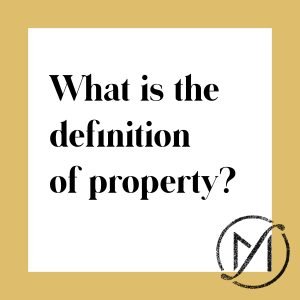What’s the Definition of Property in a Divorce?

To rule that a divorce is final, Connecticut courts need to divide the spouses’ property between them. In order to understand how property division works in Connecticut divorces, you need to understand the definition of property.
Read on to learn more.
Property Division Analysis
Generally speaking, there are three stages of analysis when it comes to property distribution in a Connecticut Divorce.
- Definition – whether an item meets the definition of property
- Valuation – what is the value of the property
- Distribution – how the property will be distributed between the spouses
Today we are discussing the first category, the definition of property.
Property Basics
“Property” is something that a person can own. Ownership is the right of one or more persons to possess and use the property to the exclusion of others.
Types of Property
There are two main types of property: “real property” and “personal property.”
Real Property
Real property is essentially what we think of as real estate. In other words, it is land plus on it everything on it (for example buildings, crops, or ponds) or under it (for example wells, mines, or minerals).
Personal Property
Personal property is everything that isn’t real property. There are two basic types of personal property — “tangible” and “intangible.”
Tangible property is personal property that you can touch and move (for example, cars, clothing, jewelry, furniture, or art). Intangible property is the opposite of tangible property. You cannot touch or move tangible property. Intangible property is a representation or evidence of value (for example, stocks, bonds, intellectual property, digital files, or internet domains).
Definition of Property
It’s critical to understand that Connecticut is an “all property” state.
Connecticut courts can divide the vast majority of property can be divided by the court. Whether it’s real property, tangible personal property, or intangible personal property, Connecticut courts almost always have the authority to distribute it between the spouses.
Whether something qualifies as property that a court can divide in a Connecticut divorce depends on whether it falls into one of two categories: “distributable property” or an “expectancy.”
What is an “Expectancy”?
But, sometimes a spouse’s rights to the property fall into the “expectancy” category. Generally speaking, this happens when a spouse doesn’t have a clear right to or ownership of the property. In other words, the spouse’s ownership is contingent on something happening.
Some examples of types of things where an ownership interest might be considered continent include:
- an inheritance
- an interest in a trust
- a pension
- some stock options
Whether that contingency rises to the level of an expectancy that the court cannot divide is very fact-specific and decided on a case-by-case basis.
How Do Courts Determine Whether an Expectancy Exists?
Determining whether property is an expectancy that cannot be divided is a very dynamic area of Connecticut divorce law. Connecticut courts have recently looked to the nature of the contingency to decide whether it was, either:
- So speculative that it’s merely an expectancy, or
- Sufficiently concrete, reasonable, and justifiable as to constitute a presently existing property interest for equitable distribution purposes.
If you think you there might be “expectancy” property involved in your case, it’s critically important to retain experienced divorce counsel familiar with all of the nuances of the current law on the definition of property. The importance of this issue isn’t limited to whether a single asset will be divided. All the financial aspects of a divorce are interrelated, which means that property division can also impact alimony.
The Comprehensive Connecticut Property Division Guide
How to divide property is one of the most important issues in divorces. And, it’s one of the most confusing. There are no set formulas or rules on how property will be divided. The good news is that creates tremendous flexibility for experienced divorce attorneys to craft an individualized approach. In order to prepare to make solid and informed decisions, you need to understand how property division works. Our Comprehensive Connecticut Property Division Guide tells you everything you need to know about property division in Connecticut.
Next Steps
To start making a plan for your divorce, reach out. Our first step at Freed Marcroft, the Goals & Planning Conference, is designed to get to the heart of your problem and unveil your true goals. We analyze those goals, plus the facts of your case, and present you with recommendations and options to move forward.








